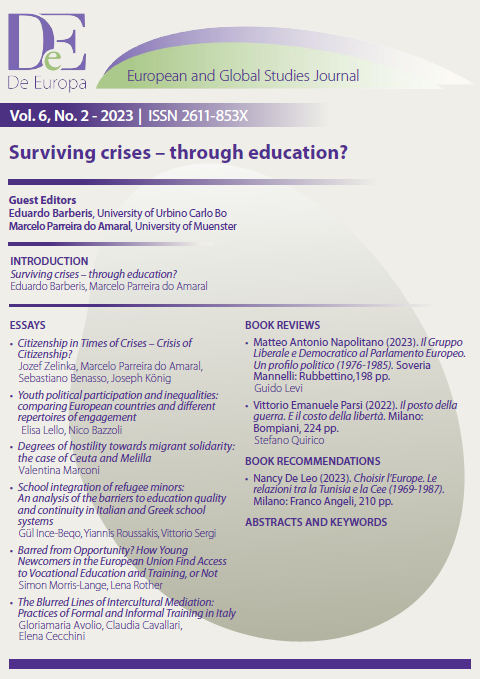The Blurred Lines of Intercultural Mediation: Professional Recognition through Formal and Informal Practices in Italy
DOI:
https://doi.org/10.13135/2611-853X/7048Abstract
Over the past few decades, Europe has been feeding on a narrative of skepticism and crisis that has not spared the discourse on migration, highlighting states’ fragmentation over the adoption of common migration man-agement policies. Long-lasting difficulties in regional integration have been heightened and efforts to build a sound knowledge-based European society weakened. European states are meeting migration challenges and in so doing are inter alia confronted with the essential role played by intercultural mediation in the interaction between foreigners and host societies. Within such a framework, this article aims at contributing to the debate on the shortcomings of integrated mediation practices across Europe. It thus analyses the theoretical frame-work on mediation, with reference to instruments adopted by both the European Union and the Council of Europe, and accompanies such a review with reflections triggered by an empirical study on mediation conduc-ted at a local level in Italy. The country sets an interesting case study, as it faces well-known migration manage-ment issues that meet Eurosceptic and nationalist tones. The research explores the regional institutional system in place, or the absence thereof, and touches upon how this is perceived and experienced by mediation professionals operating in the asylum and reception field. It provides instances of how, despite some transna-tional coordination, those who operate at the national and local level have heterogeneous backgrounds and refer to sub-state institutional frameworks that are rather far from the idea of a regionally integrated profession-alisation of the role. Drawing thus parallels between the European and the local context, the contribution suggests the rethinking of the professional figure of the mediator and the possibility of grounding the role on common educational and training paths.
Keywords: Council of Europe, European Union, Intercultural Mediation, Cultural Diversity, Migration, European Social Inclusion




 The journal has been approved for inclusion in DOAJ. The DOAJ listing of the journal is available at
The journal has been approved for inclusion in DOAJ. The DOAJ listing of the journal is available at 

